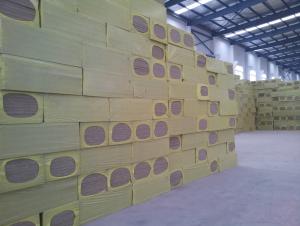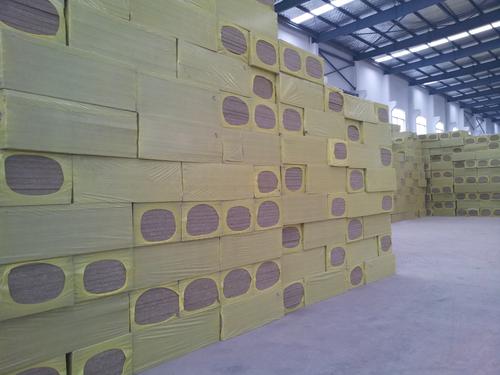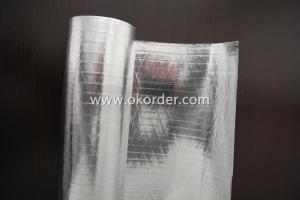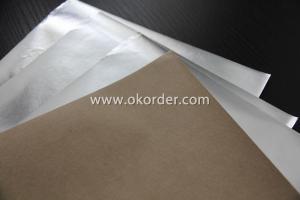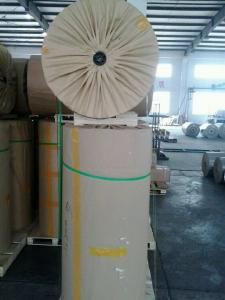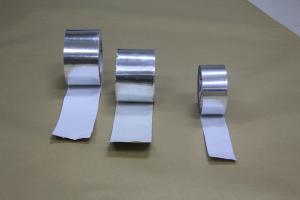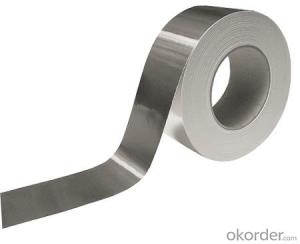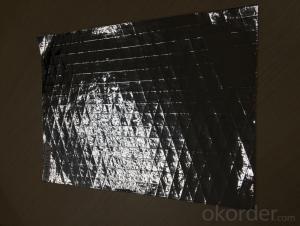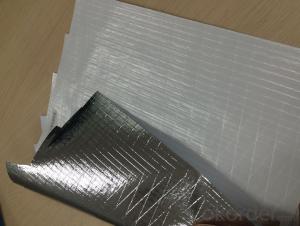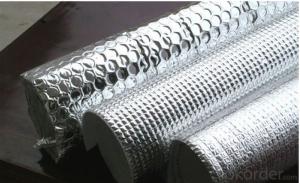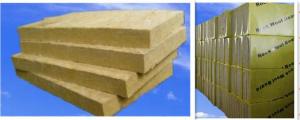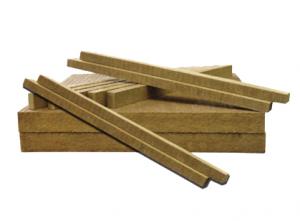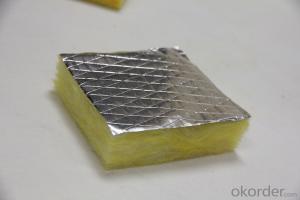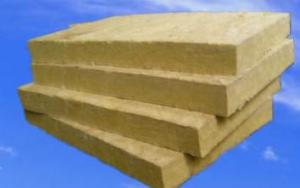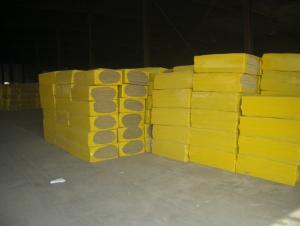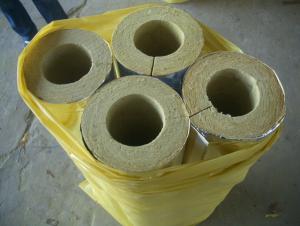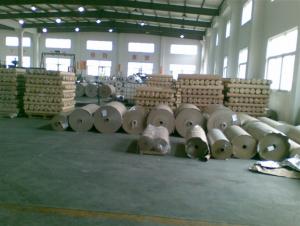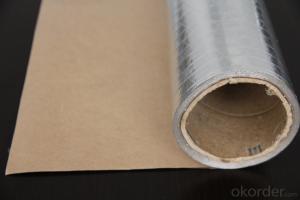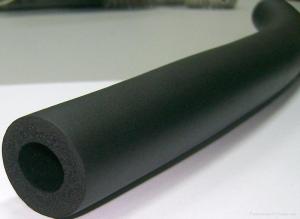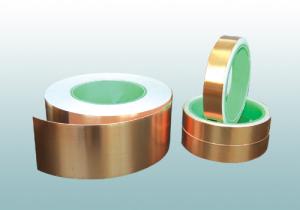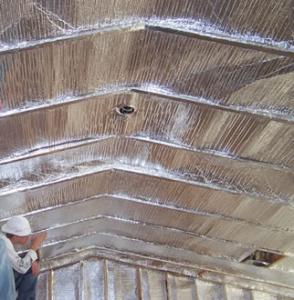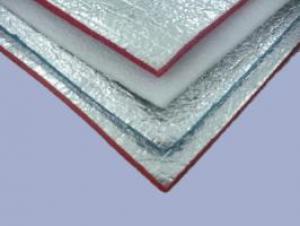Aluminum Foil Facing Rock Wool Board for Wall Partition of Highly Valued Quality
- Loading Port:
- Qingdao
- Payment Terms:
- TT or LC
- Min Order Qty:
- 1 m²
- Supply Capability:
- 700 m²/month
OKorder Service Pledge
OKorder Financial Service
You Might Also Like
1. INTRODUCTION
CMAX ROCK WOOL are widely used in public, commercial an residential building as well as industrial plants, for applications such as roofing, external wall, partion wall and floating floor to provide fire protection, thermal insulation, acoustic control and condensation control.
2. FEATURES
● Thermal Insulation
● Fire Safety
● Acoustic Control
● No Corrosion
● Environmental friendly
● Moisture Resistance
● Energy Conservation & Emissions Reduction
3. CMAX ROCK WOOL BLANKET & BOARD STANDARD SIZE
PRODUCT | BLANKET | BOARD |
Density(Kg/m3) | 60-100 | 40-200 |
Thickness(mm) | 30-150 | 30-100 |
Size:L*W(mm) | 1200*3000-6000 | 600*1200 |
Remark:
Other sizes are available unpon request. Facing materials can be applied unpon request.
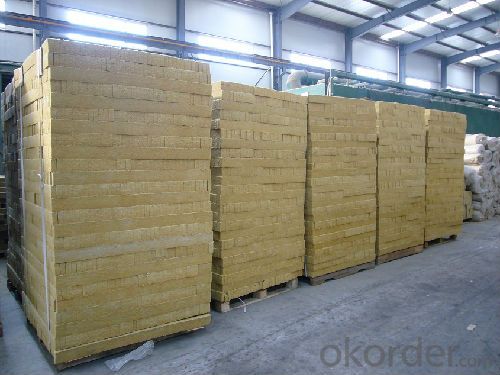
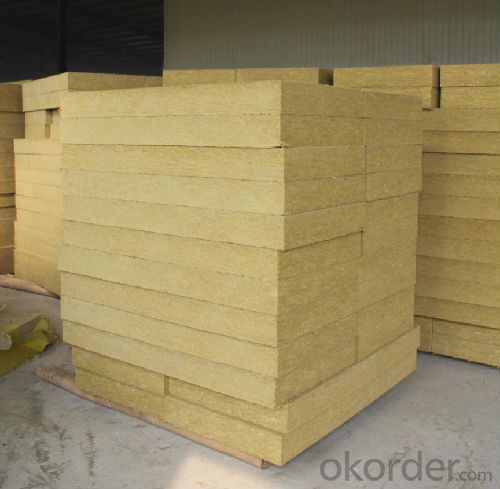
4. PRODUCTION THECHNOLOGY
CMAX rock wool is made from natural rocks such as basalt and limestone. The rocks are melted in a cupolaat temperature of >1450℃, and the molten lava is fiberized by a spinner. The inorganic fibers are bondedtogether using a thermosetting resin to form the final product which is cut into suitable sizes for easyhandling and installation. Other products such as wired blanket, pipe cover or faced products are producedby secondary process
5.FAQ:
We have organized several common questions for our clients,may help you sincerely:
①How about your company?
A world class manufacturer & supplier of castings forging in carbon steel and alloy steel,is one of the large-scale professional investment casting production bases in China,consisting of both casting foundry forging and machining factory. Annually more than 8000 tons Precision casting and forging parts are exported to markets in Europe,America and Japan. OEM casting and forging service available according to customer’s requirements.
②How long can we receive the product after purchase?
In the purchase of product within three working days, We will arrange the factory delivery as soon as possible. The pecific time of receiving is related to the state and position of customers.Commonly 40 working days can be served.
- Q: Is it possible to use aluminum foil facing as a substitute for a pizza crust?
- <p>While it's not conventional, you can technically use aluminum foil facing as a makeshift pizza crust in a pinch. However, it won't provide the same texture or taste as a traditional crust. Aluminum foil is not designed for consumption and lacks the nutritional value of a real pizza crust. It's advisable to use a proper pizza dough or a store-bought crust for the best results. If you're in a bind, consider alternatives like using a tortilla or flatbread for a makeshift crust.</p>
- Q: What precautions should be taken when handling hot food using aluminum foil as a cooking tool?
- <p>When handling hot food using aluminum foil, first ensure the foil is thick enough to withstand high temperatures without puncturing. Always use heat-resistant gloves or a thick cloth to avoid burns. Do not wrap food directly in aluminum foil if it's very hot, as this can cause the foil to tear or the food to stick. Allow the food to cool slightly before wrapping. When removing the foil from the heat source, use tongs or a spatula to avoid direct contact with the hot foil. Be cautious of steam when opening the foil, as it can be very hot.</p>
- Q: Is it appropriate to store medications using aluminum foil facing?
- <p>Aluminum foil facing is not recommended for storing medicines. While it can provide a barrier against light and air, it is not an ideal storage medium due to potential chemical reactions between the aluminum and certain medications. Medicines should be stored in their original containers with proper labels, away from light and heat, and as directed by the manufacturer or pharmacist. Using aluminum foil can lead to degradation of鑽晥 and potential contamination.</p>
- Q: What are the safety regulations or guidelines that aluminum foil facing must adhere to?
- <p>Safety standards for aluminum foil facing are crucial to ensure the product's safety and effectiveness. These standards typically include requirements for material composition, thickness, and bonding strength to ensure the foil's durability and resistance to tearing. Additionally, there are guidelines for the foil's reflectivity and heat resistance, which are important for its performance in various applications. Compliance with these standards is often verified through testing and certification processes, ensuring that aluminum foil facing products meet the necessary quality and safety benchmarks before they reach the market.</p>
- Q: This question asks for signs or methods to identify if the aluminum foil facing of a product, such as insulation or a jacket, is damaged or defective.
- <p>To determine if your aluminum foil facing is damaged or defective, look for visible signs such as tears, punctures, or holes. Check for any discoloration or rust, which could indicate corrosion. The foil should be smooth and uniform; any irregularities or bubbling might suggest a defect. Additionally, test the integrity by gently pulling or pressing the foil鈥攊f it easily tears or crumples, it may be compromised. For insulation, a damaged foil facing can lead to reduced effectiveness in heat or cold retention, so also consider the performance of the item.</p>
- Q: Is it possible to use aluminum foil facing as a serving dish for small appetizers or snacks?
- <p>Yes, you can use aluminum foil facing as a serving dish for small appetizers or snacks. It is a convenient and disposable option, especially for outdoor events or casual gatherings. Ensure the foil is clean and food-safe, and handle it with clean hands or utensils to maintain hygiene. For best presentation, you might want to fold or shape the foil into a more appealing dish-like form. However, it's not recommended for high-temperature cooking or for use with acidic or highly oily foods, as these can cause the aluminum to break down or leach into the food.</p>
- Q: The user is asking if it's possible to use aluminum foil as a cover for a casserole dish.
- <p>Yes, you can use aluminum foil as a cover for a casserole dish. It's a common practice to cover the dish with foil to prevent the top from drying out during baking or to keep the contents warm. Ensure the foil is food-grade and does not touch the heating elements of the oven. For best results, use heavy-duty aluminum foil to avoid punctures and tearing. Remember to remove the foil during the last few minutes of baking to allow the top to brown if desired.</p>
- Q: Explain the distinctions between aluminum foil facing and plastic wrap, including their composition, uses, and properties.
- <p>Aluminum foil facing is a thin layer of aluminum used for insulation, moisture protection, and as a barrier to light and air. It is commonly used in construction and food packaging for its heat and cold resistance. Plastic wrap, on the other hand, is made from plastic polymers like polyethylene and is primarily used for food storage, keeping food fresh by sealing in moisture and preventing contamination. Unlike aluminum foil, plastic wrap is transparent, clingy, and does not conduct heat, making it unsuitable for cooking or insulation purposes.</p>
- Q: This question asks for methods to utilize aluminum foil as a tool for preparing quick and easy meals.
- <p>Aluminum foil facing is a versatile tool for quick meal preparation. One method is the 'foil packet' technique, where you place ingredients like vegetables, protein, and seasonings in a foil pouch and bake or grill. This method helps retain moisture and flavor. Another way is to use foil as a makeshift baking tray for items like fish or potatoes, which can be seasoned and wrapped in foil for a one-step cleanup. Foil can also be used to cover food during grilling to prevent flare-ups or to steam vegetables. Always ensure food is cooked thoroughly and be cautious of potential aluminum leaching, especially with acidic foods.</p>
- Q: Explain the differences between aluminum foil facing and other types of food wrap.
- <p>Aluminum foil facing is a type of food wrap that is made from thin sheets of aluminum, which provides excellent barrier properties against air, moisture, and light. It is often used for cooking, baking, and preserving food. Unlike plastic wraps, it does not stick to food and can withstand high temperatures without melting. Other types of food wraps, such as plastic or cling wraps, are made from polymers and are not heat resistant. They are typically used for short-term food storage and are not suitable for cooking. Paper-based wraps, like parchment or wax paper, are used for baking and providing a non-stick surface but do not offer the same barrier properties as aluminum foil.</p>
Send your message to us
Aluminum Foil Facing Rock Wool Board for Wall Partition of Highly Valued Quality
- Loading Port:
- Qingdao
- Payment Terms:
- TT or LC
- Min Order Qty:
- 1 m²
- Supply Capability:
- 700 m²/month
OKorder Service Pledge
OKorder Financial Service
Similar products
Hot products
Hot Searches
Related keywords
